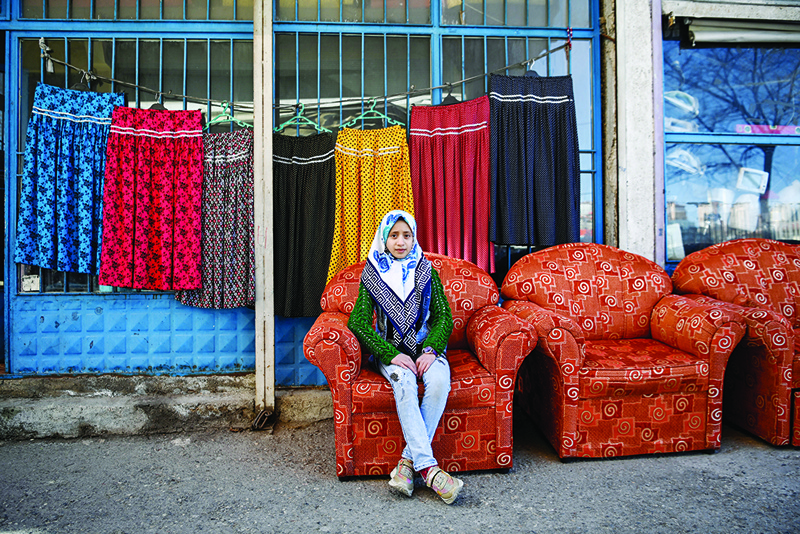 GAZIANTEP, Turkey: Syrian refugee Dalaa Hadidi, 10, poses during an interview on Feb 26, 2021. - AFP
GAZIANTEP, Turkey: Syrian refugee Dalaa Hadidi, 10, poses during an interview on Feb 26, 2021. - AFPGAZIANTEP, Turkey: Mohammad is five years old, Areej six and Dalaa 10. Syrian refugees in Turkey, these children have inherited a yearning for a country they know little to nothing about. More than 3.6 million Syrians have found shelter from the decade-long conflict in neighboring Turkey, including around 1.5 million children under the age of 15, according to official figures.
Mohammad and his parents Maher Imadedine and Rawan Sameh, originally from Aleppo, are among the 450,000 Syrians who have settled in the frontline Turkish city of Gaziantep, where the couple wed. The little boy says he wants to "return" to Syria even though he has never stepped foot there in his life. "Because it is beautiful, Syria," he says with a slight lisp. "Mum and dad told me so."
Mohammad's mother has secured a job teaching Arabic at Gaziantep University and his father works for a charity. Although settled in a relatively upscale neighborhood, they still have their minds set on returning to Syria, where they joined demonstrations against President Bashar Al-Assad's regime at the start of the revolt.
But when might that be? "When Bashar Al-Assad is in prison," the little boy replies. "I don't like him because he kills people and puts them in jail." Mohammad says he learned about these things from his parents. "He has also seen it on television," his mother cuts in. "He watches the news with us. Some things are beyond him, but he gets a general idea of what Syria is going through."
The mother fears the pictures of destruction unleashed by the Syrian forces arouse "a desire for revenge in the little ones". "Our role as parents is to channel these feelings into positive energy that can be used to help reconstruct the country," she says.
Six-year-old Areej Beidun had not yet been born when her father, who joined rebel fighter ranks, was killed in Aleppo. Since turning four months old, she has been living in a dilapidated Gaziantep apartment with her grandparents, uncles and their families - 13 people in all. Her mother has since remarried and in Areej's world, "mum and dad" are her grandparents, who have been taking care of her.
With a mischievous eye and her hair pulled back by a golden Alice band, Areej speaks of Syria with an eloquence that belies her age. "Over there, there is war everywhere. There are a lot of planes and bombs blowing up the city," she explains. "Here, when I see dolls in the market, I ask mum to buy them for me and she says 'no' because we don't have any money," she laments. "I would like Syria to be the way it was before, without bombs, so that I could go back."
Ten-year-old Dalaa Hadidi's family lives in the same decrepit neighborhood of Gaziantep. Born 45 days before the start of the revolt, she was 15 months old when her parents fled Aleppo. But she talks about the Syrian city as if she has lived there her whole life. "I want to go back to Aleppo to find my home, my neighborhood and my loved ones. I wish Assad would die so we could come back," she says.
If the feeling of belonging to Syria is handed down to the children by their parents, it is reinforced by media outlets targeting the diaspora, especially in Turkey. Himself a refugee, Mahmoud Al-Wahab, 14, presents a children's radio program called "I want to play" on Rozana, a Syrian radio station with offices in Gaziantep and Paris. "We try to instill this attachment, but in an indirect way," he says. "We broadcast information about children in Syria, but also the situation in Syria and how it was before. We also talk about the Arabic language to help the children keep their mother tongue," he says in his radio studio.
The station's director Lina Chawaf thinks "the dream of returning stays alive" even among those who manage to successfully integrate in their host countries. "Parents instill their children with a nostalgia for their home, their land, their country," she says. "As for us (at the radio station), we try to maintain it through culture, through the riddles and games that we played when we were in Syria."
The station's morning presenter Nilufer Al-Barrak says he has agreed with a few of his listeners to meet up in Syria - one day. "I asked the listeners to describe their neighborhoods in Syria and everyone talked about how beautiful theirs was," the presenter says. "So we agreed that when we return, we will invite each other over to our houses and see the places we talked about on air. And if they have not been rebuilt already, we will rebuild them together." - AFP









